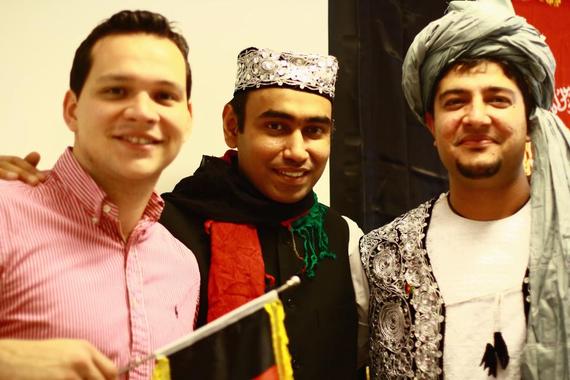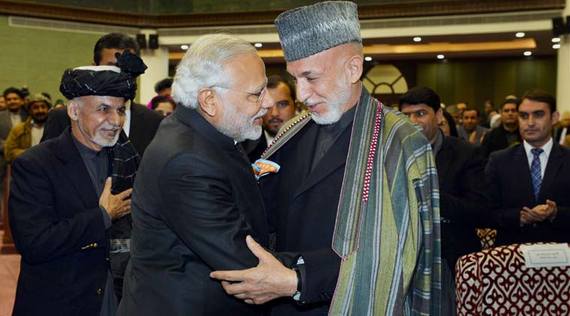
With my Afghan friend Rafi (extreme right).
Today, when the Indian media seems to be in thrall with Lenin incarnate Kanhaiya Kumar, I want to dust off something extraordinarily chivalrous, something pristine and something untouched by the political mud-slinging that is going on in the great Indian political theatre these days. Today, when from the Guardian and Independent to the New York Times, India is being portrayed without any good reason as suffocating under some kind of Hindu dictatorship, I, being an Indian, would like to take this opportunity to express my heartfelt thanks to those brave soldiers of the Afghan National Army, who have fought bravely and time and again laid down their lives defending Indian consulates.
Pakistan's doctrine of cultivating Afghanistan as a "strategic corridor" in the event of an Indian invasion is getting shattered with the increasing Indian presence in Afghanistan.
Since 2007, a series of lethal suicide attacks on Indian consulates have taken place. US intelligence and Afghan Police have, on many occasions furnished evidence of the involvement of Pakistan and its proxies like the Haqqani Network and Lashkar in these attacks. It so happens because Pakistan's doctrine of cultivating Afghanistan as a "strategic corridor" in the event of an Indian invasion is getting shattered with the increasing Indian presence and the growing popular support for it in Afghanistan. However, these attacks will never shake the confidence of India and this nation must continue its post-conflict reconstruction and development work in Afghanistan.
Whenever I write about Afghanistan, a myriad of personal memories come to the fore. During my MPA at Cornell University, I stayed with a Fulbright scholar from Afghanistan, Rafi Sherzad. I also got a chance to interact with several Afghan students who had studied at Indian universities like Jamia Millia and Hyderabad under scholarship programs run by the government of India. While interacting with them I felt the reality and robustness of the ancient bonds that have existed between India and Afghanistan since the dawn of civilization in the Indian sub-continent.
I learned that when the famous Indian soap Kyonki Saas Bhi Kabhi Bahu Thi was aired in Afghanistan the entire country sat glued to the television...
In my interactions with Afghan students, I learned that when the famous Indian soap Kyonki Saas Bhi Kabhi Bahu Thi was aired in Afghanistan the entire country sat glued to the television. The maximum number of car thefts occurred when the aforesaid soap was telecast!
Here the love of Afghans for Bollywood movies and music needs a special mention. Rafi told me that during Taliban days when there were hardly any outlets for recreation, their main source of little fun was having kahva (tea) while listening to old Bollywood songs like "Yari Hai Imaan Mera, Yar Meri Zindagi". Hikmat informed that when the film Khuda Gawah was being shot, the sturdy Pathans would wait for hours to have one glimpse of their beloved hero Amitabh Bachchan alias Badshah Khan. "The Afghans rejoiced on seeing Sunny Deol smashing the entire Pakistani state in his film Gadar for more than obvious reasons", said Rafi on one evening while treating me to Afghan raisins and Kabuli pilao. I also came to know about the Afghanistan of the 1960s and 70s when legendary singers like Ahmad Zahir, Ustad Nashenas and Ustad Saharang Khan ruled over the hearts of Afghans.
Today, it is quite difficult to imagine the Kabul of 1970s, when youth indulged in politically charged debates over Marx, Lenin and Mao and the women wore mini-skirts and European hats.
The Afghans rejoiced on seeing Sunny Deol smashing the entire Pakistani state in his film Gadar.
Interestingly, Ahmad Zahir, who was like a mix of Elvis Presley and the Bollywood actor Feroze Khan sang beautiful melodies in Persian which had the music of the old Bollywood songs of Mohammad Rafi. But when Ahmad Zahir used the Hindi music with Western beats and Persian compositions like "Khab Az Chashmanam Raboodi", they sounded absolutely refreshing, pristine and heavenly. Similarly, Ustad Nashenas has sung the songs of K L Saigal like "Aie Katibe Taqdeer" in his own unique style which sends you into a meditative trance. Whenever I listened to melodies of Ahmad Zahir and Ustad Nashenas in snowy Ithaca with my ginger tea on lazy weekends, I could feel the essence of Afghanistan, which lies in the commingling and cross-fertilization of different cultures - Hindustani, Baluchi, Arabian, Iranian, Syrian and Central Asian.
Afghanistan was the holy land where Panini wrote the Ashtadhyayi Vyaakaran (first Sanskrit Grammar). It was in Afghanistan, where the Gandhara style of Buddha sculptures developed (a combination of Greek and Indian styles). Gandhara and Kamboj, the earliest Mahajanpadas (kingdoms) of ancient India were in the modern-day Afghanistan and the famous Gandhari of the Mahabharata came from Afghanistan. Rafi told me that even now one of the common names in Afghanistan is Ulukh Khan, which interestingly was also the name of the son of Shakuni, the main conspirator of the battle of Mahabharata and the brother of Gandhari. Northern Afghanistan (Bactria) was the place where Mauryan king Chandragupta was married to Princess Helena, the daughter of Selucas Nicator, the Greek Lieutenant of Alexander. Kandahar in Afghanistan was the place where Ashokan inscriptions of peace and non-violence were written in Greek and Aramaic for the local Greek population. Similarly, in India also, Afghans have been immortalized as legendary heroes like "Frontier Gandhi" Badshah Khan, Hakim Khan Suri (Rana Pratap's General), as Kabuliwala in the stories of Tagore and as the eternal Sher Khan Pathan of the famous Hindi film Zanjeer. When Prime Minister Modi mentioned the "Sher Khan" of Zanjeer in his recent address to the Afghan Parliament, the Pathans felt a strong revival of the old emotional bonds.

Prime Minister Modi with former Afghan President Hamid Karzai
When Prime Minister Modi mentioned the "Sher Khan" of Zanjeer in his recent address to the Afghan Parliament, the Pathans felt a strong revival of the old emotional bonds.
Here I must mention that I also felt the vicarious trauma of living in a conflict-ridden nation where years of Pakistani interference and export of jihadi extremism ruined the last shreds of stability and safety. Rafi told me how his father - a colonel in Afghan army - had to resign and flee to Peshawar when the Taliban took over. His brother who was a fighter pilot migrated to Russia, never to be seen again; he himself spent his childhood selling cigarettes and water-bottles. Until the moment Hanif told me that his brother was killed in the blast outside the Indian consulate in Jalalabad, I had never felt so the pain of losing someone in an act of terrorism from such close quarters.
These interactions inspired me to establish the International Affairs Forum at Cornell University, with the help of my French colleague Laure Pouchelon. IAF is a unique student led organization in its mandate as it spreads awareness about the issues of religious extremism and promotes "soft power" in diplomacy. Its first event "Aagaaz" was a talk by Rafi Sherzaad which presented to the world community the hitherto unreported facets of Afghanistan like its music, the dance form of Attan, and the secular tribal code of "Pashtunwali" which dominated the socio-political life for last 2000 years - until political power was usurped by Taliban.
In the end, I wish a good luck to Afghanistan in her fight against the barbaric forces of Taliban and I send warm regards and love from India to Afghanistan with a strong hope that this ancient friendship will grow stronger and stronger with the passage of time.